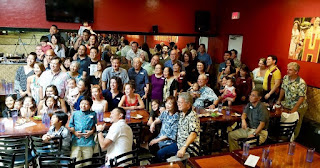I was scrolling through my FB feed on Friday and saw this post from Carol Conway. It resonated with me; I wasn’t aware that Kathleen had been a teacher in her younger days. I read that post several times and knew that I wanted to share it. I messaged Carol, and she agreed to let me use her post in my blog. Thanks, Carol! 👍 Here it is:
Do you remember 5th grade? For me, it was 1973-74, my father had died the year before and my mom, I'm sure, was struggling to keep us in our Mill Valley home. (She succeeded - thanks Mom!)
My fifth grade teacher celebrated her 100th birthday today, (and she's on Facebook!) so I tried to pry a few memories from the dark recesses of my creaky brain.
I remember the garden that Mrs Lloyd started on our school grounds. She taught us about growing food in unyielding soil. I remember learning how to do batik and making a lovely Douglas Iris on a purple background, which I turned in to a pillow. I remember going to Cronkhite beach to gather pebbles to make mosaics, and finding a single carnelian which I used to make the eye of the snail I created.
In 5th grade I remember competing with Geoff Barnard for the highest level in SRA - and winning. Mrs. Lloyd, I can picture the classroom, the tall windows facing south, and you sitting in front with an open book, looking out at us between paragraphs. I loved being read to - I have no surviving memories of what you were reading, but it was a quiet time for me when my world was tumbly, and I enjoyed it.
Mrs. Lloyd, I hope that you had a birthday full of the things and the people that you love. I hope that you know that your students felt loved and protected in your class, and that you made a difference. And I know that I speak for my brothers as well - David before me, Jeff after - you mattered to us.
Happy Birthday!
As I read and re-read this tribute to a beautiful teacher, I had a few aha's. First, 1973-1974 was my first year of teaching. I was just getting started in my career while Mrs. Lloyd was making lasting memories with her students. The second thing I noticed was that Carol remembers things like gardening and art and field trips. There's nothing in there about test scores or academics. (Hmm. . . what will students remember about their teachers 45 years from now?) Carol mentions SRA levels, something I remember from my 7th grade Reading class where, like her, I quietly competed to get to the highest level before anyone else. (Someone beat me; I was second, but once I was done, I got to read whatever I wanted to in that class.) Lastly, Carol's recollection of being read to was so touching. Mrs. Lloyd was reading aloud to her students in the fifth grade, and Carol cherished and needed that quiet time when her world was "tumbly." (In today's classrooms, read-aloud time is often eliminated as teachers rush to "cover" the curriculum, but students may need that time to settle their "tumbly" world.)
This lovely post spoke volumes about the positive impact of a teacher on a student, one who was going through emotional challenges. 45 years later, this student shared these fond memories, and I am sure Mrs. Lloyd was touched. Henry Adams said it best: "A teacher affects eternity. He can never tell where his influence ends."
Thank you, Carol, for sharing your memories of your fifth grade teacher on Facebook! What a gift to all of us!
This was a photo taken at our family reunion in 2018.
Mrs. Lloyd is somewhat hidden in this photo, but she is there in the second row from the back.
